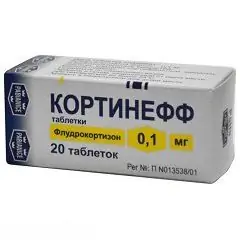- Author Rachel Wainwright wainwright@abchealthonline.com.
- Public 2023-12-15 07:39.
- Last modified 2025-11-02 20:14.
Kortineff
Kortineff: instructions for use and reviews
- 1. Release form and composition
- 2. Pharmacological properties
- 3. Indications for use
- 4. Contraindications
- 5. Method of application and dosage
- 6. Side effects
- 7. Overdose
- 8. Special instructions
- 9. Application during pregnancy and lactation
- 10. Use in childhood
- 11. In case of impaired renal function
- 12. For violations of liver function
- 13. Drug interactions
- 14. Analogs
- 15. Terms and conditions of storage
- 16. Terms of dispensing from pharmacies
- 17. Reviews
- 18. Price in pharmacies
Latin name: Cortineff
ATX code: H02AA02
Active ingredient: fludrocortisone (fludrocortisone)
Producer: Pabyanitsky pharmaceutical plant Polfa, JSC (Poland)
Description and photo update: 2018-27-07
Prices in pharmacies: from 89 rubles.
Buy

Kortineff is a drug that has a glucocorticoid and mineralocorticoid effect.
Release form and composition
Dosage form Kortineff - tablets: round, with flat surfaces, beveled, white with a creamy shade, the letter "F" is embossed on one side, on the other there is a notch for breaking (20 pcs. In orange glass bottles, each bottle is placed in a cardboard box).
Composition of 1 tablet:
- active substance: fludrocortisone acetate - 100 mcg;
- additional components: gelatin, potato starch, magnesium stearate, lactose.
Pharmacological properties
Pharmacodynamics
Fludrocortisone acetate - the active substance of Cortineff is a synthetic adrenal cortex hormone, fluorinated with a hydrocortisone derivative, which has a high mineralocorticoid activity. Compared with hydrocortisone, the mineralocorticoid effect of fludrocortisone is 100 times greater, and the anti-inflammatory effect is 10-15 times.
The drug increases the excretion of hydrogen and potassium ions, enhances the reabsorption of water and sodium in the renal tubules. Blood pressure rises due to an increase in intracellular fluid volume and sodium retention.
When using Cortineff in doses exceeding the recommended therapeutic ones, it is possible to inhibit the activity of the adrenal cortex and the thymus gland, as well as the secretion of adrenocorticotropic hormone (ACTH) by the pituitary gland. The drug can contribute to the deposition of glycogen in the liver, and in the case of insufficient intake of protein in the body along with food - lead to a negative nitrogen balance.
Indications for use
- adrenogenital syndrome (congenital adrenal hyperplasia);
- primary insufficiency of the adrenal cortex (condition after complete adrenalectomy, Addison's disease);
- secondary insufficiency of the adrenal cortex;
- arterial hypotension and hypovolemia of various origins.
Contraindications
- systemic fungal infections;
- hypersensitivity to any component of the drug.
Cortineff should be used with caution in the presence of the following diseases / conditions:
- parasitic and infectious diseases of a bacterial nature (including recently transferred ones, including contact with a patient): measles, chickenpox, herpes zoster (viremic phase), herpes simplex, strongyloidosis (established or suspected), amebiasis;
- severe infectious diseases (the drug can be used only against the background of specific therapy);
- active and latent tuberculosis;
- cardiovascular diseases, including arterial hypertension, decompensated chronic heart failure, recent myocardial infarction (in acute and subacute myocardial infarction, there is a risk of spreading the focus of necrosis, slowing down the formation of scar tissue and, as a result, rupture of the heart muscle);
- thyrotoxicosis, hypothyroidism;
- obesity of III-IV degree;
- Itsenko-Cushing's disease;
- diabetes mellitus (including impaired carbohydrate tolerance);
- hyperlipidemia;
- hypoalbuminemia and conditions that predispose to its occurrence;
- poliomyelitis (except for the form of bulbar encephalitis);
- mental disorders, acute psychosis;
- myasthenia gravis;
- peptic ulcer or duodenal ulcer, osteoporosis, gastritis, ulcerative colitis, esophagitis, acute or latent peptic ulcer, intestinal diverticulosis, recent bowel anastomosis, history of gastrointestinal tract surgery;
- renal failure, impaired liver function;
- HIV infection, AIDS (the decision to use Cortineff should be made after a careful balance of benefits and risks for the patient);
- lymphadenitis after BCG vaccination;
- post-vaccination period (8 weeks before and 2 weeks after vaccination).
Instructions for use of Kortineff: method and dosage
Cortineff should be taken orally, after meals, swallowing the tablets whole with plenty of liquid. When prescribing small doses, it is recommended to take the entire dose in the morning, when prescribing high doses, 2/3 in the morning and 1/3 in the afternoon.
The doctor sets the doses individually, depending on the indication, the patient's condition and the effectiveness of therapy. There may be a need for dose adjustment during treatment: when the clinical picture changes or in stressful situations (for example, during infection, trauma, surgery).
In adult patients, when carrying out replacement therapy, the optimal dose can vary from 100 μg three times a week to 200 μg per day.
The initial daily dose of Cortineff for children with adrenogenital syndrome is 300 mcg. Then, within several months, it is reduced to 50-100 mcg per day. The maintenance daily dose for infants is 100-200 mcg, for children from 1 year old - 50-100 mcg.
If you miss the next dose, you should take the pills as soon as possible. If the time for the next dose is already approaching, then the missed dose should not be taken. Do not take a double dose at a time.
For any indication, Cortineff should be used in the lowest effective dose. As soon as the opportunity arises, the dose is gradually reduced.
Side effects
The main side effects of the drug are: hypocalcemia, hypernatremia, peripheral edema, circulatory failure, arterial hypertension, left ventricular hypertrophy.
With long-term treatment and / or taking Cortineff concurrently with other corticosteroids, the following adverse reactions may occur:
- on the part of the cardiovascular system: obliterating endarteritis, thrombosis, arrhythmias, hypercoagulation, changes in the electrocardiogram characteristic of hypokalemia, bradycardia (up to cardiac arrest); in patients with subacute and acute myocardial infarction - the spread of the focus of necrosis and a slowdown in the formation of scar tissue, as a result of which rupture of the heart muscle is possible;
- on the part of the musculoskeletal system: loss of muscle mass, muscle weakness, rupture of muscle tendons, aseptic necrosis of the femoral and humerus heads, compression fracture of the spine, osteoporosis, pathological fractures of long bones, steroid myopathy (more common in women; usually begins with muscles pelvis of the femoral girdle and extends to the proximal muscles of the hands, in rare cases, affects the respiratory muscles);
- from the nervous system: headache, dizziness, sleep disturbances, convulsions, increased intracranial pressure with congestive optic papilla syndrome (pseudotumor of the brain; often occurs in children, usually after a too rapid dose reduction; manifests itself as headache, decreased visual acuity or double vision in eyes);
- from the psyche: mania, delirious syndrome, symptoms mimicking schizophrenia (most often in women during the first 2 weeks of treatment);
- from the digestive system: digestive disorders, hiccups, increased or decreased appetite, flatulence, nausea, pancreatitis, vomiting, ulcerative esophagitis, steroid ulcer with possible perforation and bleeding; rarely - increased activity of hepatic transaminases and alkaline phosphatase;
- from the metabolic side: hypocalcemia, glucosuria, hyperglycemia, increased Ca 2+ excretion, negative nitrogen balance (as a result of protein catabolism), hypokalemic syndrome (hypokalemia, unusual weakness, fatigue, muscle spasm, myalgia, arrhythmia) and hypernatremia due to mineralocorticoid activity;
- on the part of the sensory organs: exophthalmos, a tendency to develop secondary fungal, bacterial or viral eye infections, glaucoma (usually with therapy for at least a year), trophic changes in the cornea, increased intraocular pressure, posterior subcapsular cataract (usually disappears after discontinuation of the drug, but may be required surgery);
- endocrine status: decreased carbohydrate tolerance, manifestation of latent diabetes mellitus and increased need for insulin or oral hypoglycemic agents, secondary adrenal and hypothalamic-pituitary insufficiency (especially in concomitant stressful situations such as illness, surgery or trauma), menstrual irregularities, Cushing's syndrome, hirsutism, growth suppression in children;
- on the part of the skin and mucous membranes: increased sweating, thinning of the skin, delayed wound healing, atrophic stripes, ecchymosis, urticaria, erythema, acne, allergic dermatitis, hyper- or hypopigmentation, hematomas, petechiae, tendency to develop pyoderma and candidiasis, angioedema;
- others: masking the symptoms of infectious diseases, weight gain, withdrawal syndrome, fainting, leukocyturia, anaphylactic reactions; with the simultaneous use of immunosuppressants or vaccination - the development or exacerbation of infections.
Overdose
An overdose of Cortineff can manifest itself as hypokalemia, peripheral edema, arterial hypertension, cardiac muscle hypertrophy, and a significant increase in body weight.
If symptoms of an overdose appear, the drug should be discontinued, usually the condition will return to normal within a few days. In muscle deficiency caused by loss of potassium, it is necessary to make up for the lack of potassium. Further, treatment with Cortineff is resumed, but at a lower dose.
To prevent overdose, it is recommended to regularly check blood pressure and the concentration of electrolytes in blood serum.
special instructions
Treatment should be carried out exactly as prescribed by your doctor.
In stressful situations, parenteral administration of corticosteroids is recommended.
During therapy, children should be under close medical supervision, especially the indicators of development and growth should be carefully monitored.
The effect of fludrocortisone is enhanced in patients with cirrhosis and hypothyroidism.
Cortineff can contribute to the development of mental disorders such as mood swings, insomnia, severe depression, personality changes, euphoria, psychosis symptoms. If the patient had psychotic tendencies or emotional instability before taking the drug, they may worsen during treatment.
Patients with concomitant hypoprothrombinemia, receiving acetylsalicylic acid, should be careful while using Cortineff.
You can not abruptly stop therapy, since there is a high risk of developing acute adrenal cortex insufficiency. The development of a withdrawal syndrome is also possible: anorexia, fever, general weakness, joint and muscle pain. Withdrawal symptoms can occur even when there is no adrenal insufficiency. Given this, the dose of the drug should be reduced gradually.
Cortineff can mask the symptoms of infectious diseases, as well as reduce the body's resistance to infection and the ability to localize it.
With long-term treatment, the likelihood of developing secondary fungal / viral infections increases.
Vaccination with live viral vaccines is contraindicated in patients receiving Cortineff. When an inactivated bacterial or viral vaccine is given, the expected increase in antibody levels may not be observed. In addition, there is an increased risk of neurological complications during vaccination in patients taking corticosteroids.
Influence on the ability to drive vehicles and complex mechanisms
No information available.
Application during pregnancy and lactation
For pregnant women and women of childbearing age, corticosteroids should only be prescribed if the expected benefits outweigh the potential risks. Patients with adrenal insufficiency during pregnancy should continue to take Cortineff, and an increase in its dose may be required.
If therapy is required during lactation, it is recommended to stop breastfeeding.
Pediatric use
With prolonged treatment with the drug, children should be carefully monitored for their growth and development.
With impaired renal function
According to the instructions, Cortineff should be used with caution in patients with renal impairment.
For violations of liver function
The effect of fludrocortisone is enhanced with concomitant liver cirrhosis.
Cortineff should be used with caution in the treatment of patients with impaired liver function and hyperlipidemia.
Drug interactions
Antihistamines, antiepileptic drugs (phenytoin, carbamazepine), barbiturates, glutethimide, rifampicin weaken the effect of fludrocortisone.
Anticoagulants (indandione, coumarin derivatives, heparin), urokinase and streptokinase can reduce, and in some cases increase the effectiveness of fludrocortisone, so the dose is determined individually based on the prothrombin time. Also, when using such combinations, the risk of ulceration and bleeding from the gastrointestinal tract increases.
Ephedrine may speed up the metabolism of fludrocortisone, which will require dose adjustment of Cortineff.
Tricyclic antidepressants are contraindicated in the treatment of mental disorders caused by taking Cortineff, since they can increase their severity.
Oral contraceptive drugs containing estrogens increase the concentration of globulins, which bind corticosteroids in the blood serum, and also slow down metabolism, increase the half-life of fludrocortisone and, as a result, enhance its effect.
With the simultaneous use of drugs that block neuromuscular conduction (for example, depolarizing muscle relaxants), there is a high risk of developing hypocalcemia caused by Cortineff. Fludrocortisone, in turn, may prolong the duration of the neuromuscular blockade.
Possible effects of fludrocortisone on concomitantly used drugs:
- cardiac glycosides: increases the risk of cardiac arrhythmias and the development of toxic symptoms due to hypokalemia;
- androgens, anabolic steroids: increases the likelihood of developing acne and peripheral edema (special care is required for patients with liver or heart disease);
- oral hypoglycemic drugs, insulin: weakens their effect, increases the concentration of glucose in the blood (dose adjustment is necessary);
- laxatives, potassium-sparing diuretics: weakens their effect, increases the likelihood of hypokalemia;
- non-steroidal anti-inflammatory drugs, including acetylsalicylic acid: weakens their effect, increases the risk of developing ulcers and bleeding from the gastrointestinal tract;
- immunosuppressive drugs: increases the risk of infection, lymphoma, or other lymphoproliferative diseases;
- carbonic anhydrase inhibitors, amphotericin B: may cause hypokalemia, circulatory failure, ventricular hypertrophy;
- preparations and food containing sodium: increases the likelihood of the formation of peripheral edema and the development of arterial hypertension (it may be necessary to limit sodium intake with food and drugs with a high sodium content, but in some cases the use of corticosteroids requires additional sodium administration);
- vaccines containing live viruses: fludrocortisone in immunosuppressive doses can promote viral replication (as a result of which viral diseases develop) and reduce the production of antibodies (a contraindicated combination);
- other vaccines: increases the risk of neurological complications and decreases the production of antibodies.
Analogs
Florinef is an analogue of Kortineff.
Terms and conditions of storage
The shelf life is 3 years.
Store at a temperature not exceeding 25 ° C, protected from light and dry. Keep out of the reach of children.
Terms of dispensing from pharmacies
Dispensed by prescription.
Reviews about Kortineff
Reviews of Kortineffe are positive. Patients confirm that the drug is effective, however, given the severity of the diseases for which it is prescribed, they emphasize that the pills should be taken strictly as prescribed by the doctor.
The disadvantages of Cortineff include a large list of possible side effects, as well as conditions in which the drug should be used with extreme caution. In addition, this tool is not sold in all pharmacies, but it is inexpensive.
Price for Cortineff in pharmacies
The approximate price for Cortineff is 100-135 rubles. per bottle containing 20 tablets.
Kortineff: prices in online pharmacies
|
Drug name Price Pharmacy |
|
Kortineff 0.1 mg tablets 20 pcs. 89 RUB Buy |
|
Kortineff tablets 0.1mg 20 pcs. 109 RUB Buy |

Anna Kozlova Medical journalist About the author
Education: Rostov State Medical University, specialty "General Medicine".
Information about the drug is generalized, provided for informational purposes only and does not replace the official instructions. Self-medication is hazardous to health!






